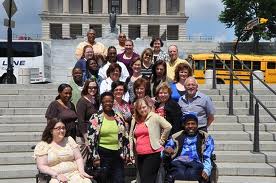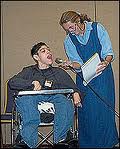The Minnesota Governor’s Council on Developmental Disabilities (MN DD Council) does remarkable work. On this blog, I often reference the Parallels in Time (history of people with disabilities) and their Partners in Policymaking Program.
This week MNDDC announced a new FREE app called “Telling Your Story.” Already it has being downloaded around the globe.
EVERYONE has a story.
EVERYONE wants to solve their problems.
EVERYONE wants to be heard.
BUT, SOME People need extra support, skills and confidence to tell others what they want and need.
“Telling Your Story” is for Everyone
Everyone knows personal stories are the most powerful way to influence policymakers and legistlaters. Stories make the rules, regulations and policies become real.
The new “Telling Your Story” app for IPads is an organizational tool to make it easier to tell those stories.
It was created to help adults with disabilities be an active part of the democratic process and find their voice, their confidence and then–their Policymaker.
The “Telling Your Story” App is easy to use and is written for self-advocates–but mom, dad, brothers, sisters, grandparents and allies can use the same template.
The simple format helps advocates compose and practice the personal story they’ll present to elected public officials or other policymakers at all levels of government.
Some of the self-advocates learned to use this app in the Partners in Policymaking Program.
The app guides users through the steps:
–introducing yourself
–identifying the specific issue
–presenting a compelling personal story in text
–creating an audio recording to practice and rehearse their story
–selecting a photo they may wish to include
Budget Cuts| It’s Personal
Here is an example of one self-advocate’s compelling story using the new app. She is explaining how a recent budget cut affects her life and will cost the state more in the long run.
This is MY STORY:
My name is Thea Graham. I live in your district. I have been waiting all year to come to the Capitol to meet with you. I want to tell you a little about myself.
Currently, I live with my mother. She is very good to me and I love her a lot. I do know that I will not always be able to live with my mom. We have been looking at different residential support options to see what would be the best match.
I know when I move out, I will need staff to support me in using my “wise mind” since I can get upset. Staff will also need to help me with making sure that I look nice since this is very important to me. They will also need to help me drive to the doctor and help me understand what the doctor is saying about my health needs. My mom does all of this for me now.
I receive services at Merrick, Inc., a day program in Vadnais Heights. It is here that I have learned to use my “wise mind” more and more. Before I would swear, yell, and hit people when I got mad—now I use my “wise mind”. This means that I “stop, calm down, think, and come up with another solution that will help resolve the situation”. I do the following jobs at Merrick: pick up plastic recycling at the Maplewood Mall, package medical supplies, take Styrofoam from Culligen caps, and shred pull tabs. I love to make money and work like everyone else does. My job coach Kathy and “Christian” support at my job and they tell me I am doing a good job not only with jobs but how I handle things that come my way. Another thing that I like about Merrick is that I have learned to speak up for myself—doing so assertively not aggressively. Above is a picture of me running for office at a Wednesday morning self-advocacy group meeting. One of my role models is Rosa Parks and the difference she made on the lives of others. On Martin Luther King Day, I have been Rosa Parks showing her role in the bus boycott play. It makes me feel proud to be “Rosa Parks”.
I feel that I have come a long way since coming to Merrick over 13 years ago. However, my CSSA funding for Merrick was significantly cut as of January 1st.
Instead of receiving services for 5 days per week, I only have funding for 2 days. This is a huge burden on my elderly mother who now is taking care of me the 3 days I am not able to attend Merrick, Inc. My mother is not in good health and I am worried about her.
If I am sitting at home alone, I am not making money. I am not at my job where I am relied on to do my work. I am not continuing to build on my skills to cope with being frustrated and angry.
Please hear my story and know that I can’t sit at home. If I end up in crisis, it would cost the state a whole lot more than it would be maintaining my day program services. It is the proactive thing to do—it is the right thing to do.
Download Free App for IPad Here
Click Here for free “Telling Your Story” App. for IPad 2 or newer
Click Here for more information on the “Partners in Policymaking” Homepage.
——————————————————————————————————–
How can Professionals Use this App?
Many children and adults with disabilities and their families are going to need technical and emotional support for using this app.
Some will not have an IPad available. Some will need coaching or help in transcribing their words onto paper. Some will need encouragement to overcome fears and answer questions.
Transition and High School Teachers:
There could be all kinds of uses for this app. especially in a Problems of Democracy class or in any advocacy or problem solving situation. I would think the format could be adapted for completing many general education projects and assignments. This could also be part of Transition or Speech Language Communication session (social stories?). Learning to use this technology and format would make an excellent IEP/ITP goal.
University Professors:
University students in Introductory to Special Education or Geriatrics, Disability Studies, social work, legal or medical professions could use this app to interview and help support a person who struggles in Making Your Case and get their thoughts organized. This app could create cooperative learning and inclusion opportunities.
This would also be a great project for a Special Olympics Buddies, SCEC or Service Learning.
There could be research potential for all majors. Does this app empower and support vulnerable people? Does this make a difference?….
Self-Advocacy Groups:
This is a gold-mine for empowerment, self-determination, voting, citizenship and lessons on democracy. Veterans and senior citizen groups might also be interested in grants or projects for their own members.
Direct Care Workers:
I can see this being used at places of employment and leisure/recreation to help people tell their wants, needs, likes and dislikes and get a better quality of life.
What do you think?
Will this app “Telling Your Story” help children and adults with disabilities tell their own stories? Would this app make it easier for someone you care about? Do you think it is important that policymakers like school board members, county, state and national legislators hear from the people in their own voices? Tell me, will you download this app and use it?
Keep Climbing: Onward and Upward
All my best,
Mary
Related Posts:
Partners in Policymaking| 25 Years in Making the Government Work
Autism| A lot more needed than awareness
Remarkable Parents and Advocates who never give up
Communication| “A Lottery Winner in Life”
—


